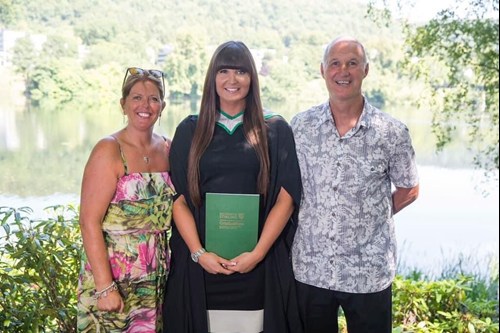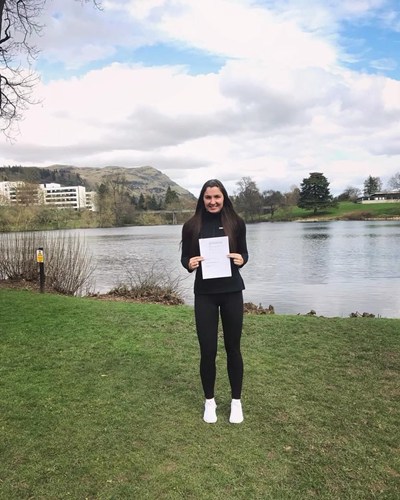Applying to university
Published Date: 20 Jan 2022
Applying to university can seem quite daunting. I remember filling everything out and then getting to the personal statement section and staring at my blank screen for ages. How does one big themselves up and make them seem like the best thing since sliced bread?
It’s hard to write good things about yourself without coming across as big-headed or overconfident. You don’t want to seem like a know-it-all. On the other hand, you don’t want to come across as someone who doesn’t deserve their place on the course, someone who isn’t confident or wouldn’t fit in. It’s a hard balance to find. It’s even harder to write a personal statement and university application when you have a disability.
I wrote in an earlier blog about the stigma and fear that comes to ticking that little box that says 'Do you have a disability?'. It was the same when I applied to uni. I didn’t want to tick it, and even my dad wasn’t sure if I should. But how do I write my personal statement and talk about all my deaf world records and deaf awards without clicking the disability box? Do I just ignore the word ‘deaf’ and write, 'I have broken 10 world records, won sports personality of the year…'? Then I would be lying my way into university, and that’s not exactly a great way to get in.
In the end I ticked the box. I ended up explaining in my personal statement (which is a limited word count) that being deaf wouldn’t hold me back or interfere with my studies, and I wouldn’t be a burden to lecturers and so on. Sad that I wasted characters on that instead of talking about things I’ve achieved in life, like my A in higher music.
I applied for sports courses - still not entirely sure that it was what I wanted to do - and got some unconditional and conditional offers. I was looking at which university would be best for my swimming career as opposed to what course was best, so the University of Stirling was my top choice. I got an unconditional offer and a scholarship offered to me, and I took it.
University was a bit different for me. I didn’t live the normal student life of partying, pulling all-nighters, or cramming my essays in to make the deadline which was due in an hour. I was a scholar, and so swimming came first, then my degree. I didn’t need or want any extra support when it came to lectures. The option was there: I could get a transcript, I could have an interpreter, I could do extra study time after classes one-to-one. I wasn’t that bothered - I was passing classes, that’s all that I needed to do to keep my scholarship. I think I used the uni library once or twice in my four years, and one of those times was to print something. The whole idea that you spend four years with your head in books and pull all-nighters with multiple cups of coffee to get you through your time is a bit of a stretch. I didn’t even like coffee back then. I got through uni with Lucozade and the internet.
I remember being halfway through my degree and thinking, 'What am I even going to use this for? What do I even want to do?'. I had thought of studying forensics as I love anything crime and unsolved mysteries. But I knew that would require more time being put into my studies and less time into my swimming. So, I carried on and finished my sport and exercise science degree.
I graduated with an Upper Class Honours degree, and I honestly don’t know how. I could have put a lot more effort into it had I not been so focused on my sports career. Four years of studying for a degree that hasn’t really been all that significant to what I do now. I am a personal trainer and sports development officer at a football club - I ended up getting my personal trainer qualification in the last two weeks of my uni course whilst doing my dissertation, and I actually needed only that qualification to do the job I’m in. My degree obviously helped and does still help me - I have extra knowledge, and I look more qualified on paper when up against another applicant who doesn’t have a degree - but if I didn’t have my degree, I would still be qualified enough to do the job I’m in.
I’m not saying I regret university. It allowed me to travel the world and become a world and Deaflympic champion in a sport I loved. I met so many new people and accomplished so many things in my time there. However, it is not the be all and end all if you don’t get into university. Over the years I think we’ve moved away from this idea that you have to have a degree to be successful and get a well-paid job. You could study for seven years to become a doctor and absolutely hate it within your first year. You could do a two-year apprenticeship on something that maybe doesn’t pay as much, but you absolutely love it. I didn’t know what I wanted to do at 17. Heck, I still don’t know what I want to do or be at 25. You could end up going to university to study history and leave with a degree in law 10 years later.

You’re not the same person at 17 that you are at 25. Just like you’re not the same person you were at 12 to now. We’re always changing. Our hobbies and interests and things that spark joy in us are constantly evolving, and that’s life. If you get into university and you get the course and offer you wanted to, that’s great and I’m so happy for you and I hope it’s everything you hoped it would be. If you don’t get accepted, and you end up on a completely different path in life than you expected, don’t worry. Maybe a few years down the line, you’ll be thankful you didn’t spend four years doing something you no longer want to do.
Everything happens for a reason.
Find yours.
